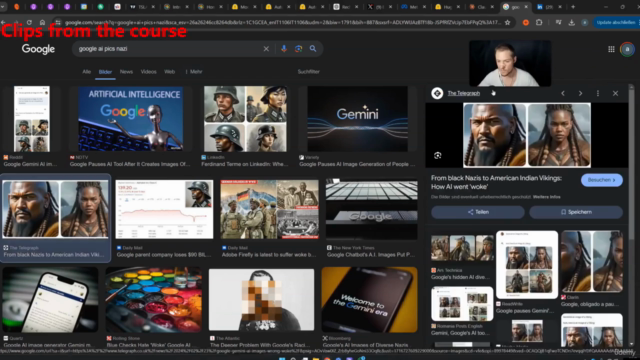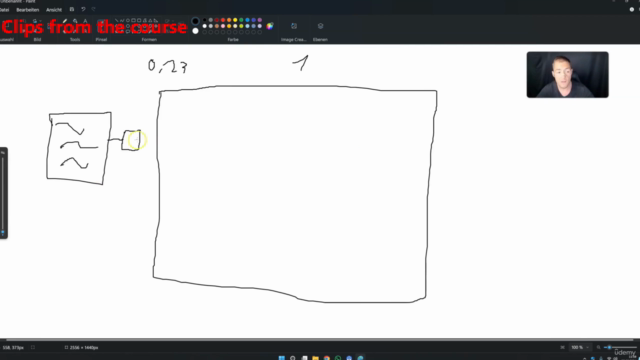Open-source LLMs: Uncensored & secure AI locally with RAG
Private ChatGPT Alternatives: Llama3, Mistral a. more with Function Calling, RAG, Vector Databases, LangChain, AI-Agents
4.71 (1351 reviews)

11 868
students
10 hours
content
Mar 2025
last update
$119.99
regular price
What you will learn
Why Open-Source LLMs? Differences, Advantages, and Disadvantages of Open-Source and Closed-Source LLMs
What are LLMs like ChatGPT, Llama, Mistral, Phi3, Qwen2-72B-Instruct, Grok, Gemma, etc.
Which LLMs are available and what should I use? Finding "The Best LLMs"
Requirements for Using Open-Source LLMs Locally
Installation and Usage of LM Studio, Anything LLM, Ollama, and Alternative Methods for Operating LLMs
Censored vs. Uncensored LLMs
Finetuning an Open-Source Model with Huggingface or Google Colab
Vision (Image Recognition) with Open-Source LLMs: Llama3, Llava & Phi3 Vision
Hardware Details: GPU Offload, CPU, RAM, and VRAM
All About HuggingChat: An Interface for Using Open-Source LLMs
System Prompts in Prompt Engineering + Function Calling
Prompt Engineering Basics: Semantic Association, Structured & Role Prompts
Groq: Using Open-Source LLMs with a Fast LPU Chip Instead of a GPU
Vector Databases, Embedding Models & Retrieval-Augmented Generation (RAG)
Creating a Local RAG Chatbot with Anything LLM & LM Studio
Linking Ollama & Llama 3, and Using Function Calling with Llama 3 & Anything LLM
Function Calling for Summarizing Data, Storing, and Creating Charts with Python
Using Other Features of Anything LLM and External APIs
Tips for Better RAG Apps with Firecrawl for Website Data, More Efficient RAG with LlamaIndex & LlamaParse for PDFs and CSVs
Definition and Available Tools for AI Agents, Installation and Usage of Flowise Locally with Node (Easier Than Langchain and LangGraph)
Creating an AI Agent that Generates Python Code and Documentation, and Using AI Agents with Function Calling, Internet Access, and Three Experts
Hosting and Usage: Which AI Agent Should You Build and External Hosting, Text-to-Speech (TTS) with Google Colab
Finetuning Open-Source LLMs with Google Colab (Alpaca + Llama-3 8b, Unsloth)
Renting GPUs with Runpod or Massed Compute
Security Aspects: Jailbreaks and Security Risks from Attacks on LLMs with Jailbreaks, Prompt Injections, and Data Poisoning
Data Privacy and Security of Your Data, as well as Policies for Commercial Use and Selling Generated Content
Course Gallery




Loading charts...
Comidoc Review
Our Verdict
Open-source LLMs: Uncensored & secure AI locally with RAG offers an engaging and practical approach to understanding and implementing private chatGPT alternatives. While it does not provide comprehensive coverage of coding or theoretical concepts, the course excels at offering valuable insights into using tools like Llama3, Mistral, and more for various applications. However, if you're looking for a deeper dive into LLM differentiation or are focused on hands-on coding experiences, this course may not be your best fit.
What We Liked
- In-depth exploration of open-source Large Language Models (LLMs) like Llama3, Mistral, and more, providing an attractive alternative to censored and closed-source models.
- Hands-on learning with practical examples, prompt engineering techniques, and cloud deployment insights, enabling you to create your own assistants in HuggingChat and utilize open-source LLMs with fast LPU chips.
- Comprehensive introduction to various applications such as function calling, RAG, vector databases, LangChain, and AI-Agents for a wide range of scenarios, from data analysis to chatbot development.
- Additional tools, tips, and resources provided, including text-to-speech with Google Colab, finetuning open-source LLMs with Google Colab, and renting GPUs from providers like Runpod or Massed Compute for insufficient local PCs.
Potential Drawbacks
- Lacks in-depth coverage of coding or practical development, potentially limiting the learning experience for those seeking hands-on lessons.
- Some course materials, such as the instructor's notebooks, are not directly linked, which may hinder following along closely with the course content for some learners.
- Limited guidance on explaining differences or purposes of various LLM models, making it challenging for beginners to navigate the diverse landscape of LLMs.
- Occasionally references uncovered topics like LangChain and LlamaIndex without detailed exploration, which may lead to confusion for those interested in these specific areas.
6047215
udemy ID
28/06/2024
course created date
15/07/2024
course indexed date
Bot
course submited by